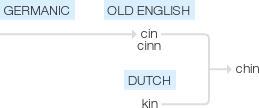Chin
Old English cin, cinn, of Germanic origin; related to Dutch kin, from an Indo-European root shared by Latin gena ‘cheek’ and Greek genus ‘jaw’.
wiktionary
From Middle English chyn, from Old English cin or ċinn(“chin”), from Proto-Germanic *kinnuz(“chin”), from Proto-Indo-European *ǵénus(“chin, jaw”). Compare West Frisian/Dutch kin, Low German/German Kinn, Danish kind, Icelandic kinn, Welsh gen, Latin gena, Tocharian A śanwem, Ancient Greek γένυς(génus, “jaw”), Armenian ծնոտ(cnot), Persian چانه (čâne), Sanskrit हनु(hánu). Doublet of gena.
Shortening of chinchilla.
etymonline
chin (n.)
"lower extremity of the face below the mouth," Old English cin, cinn "chin," a general Germanic word (compare Old Saxon and Old High German kinni; Old Norse kinn; German Kinn "chin;" Gothic kinnus "cheek"), from PIE root *genu- (2), probably originally "jaw, jawbone," but also forming words for "chin, cheek."
The West Germanic words generally mean "chin," but there are traces of earlier use as "jaw," such as Old English cinbane "jawbone," and the words for "cheek," "chin," and "jaw" naturally overlap and interchange; compare cheek (n.), which originally meant "jaw," and Latin maxilla, which gave Italian mascella "jaw," but Spanish mejilla "cheek."
To take it on the chin "be hit hard" in a figurative sense (sometimes suggesting "ability to withstand punishment"), is from 1924, an image from pugilism. To keep (one's) chin up "remain optimistic amid adversity" is from 1913, though the image itself is older.
I discovered the other day another simple means of producing cheerfulness—raise the chin—with the chin up, the whole mental attitude is changed. If you feel a bit blue or discouraged, just raise your chin, and you will find that things look different; whereas the mere appearance of a man with his chin down suggests that he is disconsolate. [National Magazine, November 1906]
chin (v.)
1590s, "to press (affectionately) chin to chin," from chin (n.). Meaning "to bring to the chin" (of a fiddle) is from 1869. Slang meaning "to talk, gossip" is from 1883, American English. Related: Chinned; chinning. Athletic sense of "raise one's chin over" (a raised bar, for exercise) is from 1880s.
